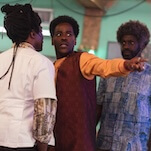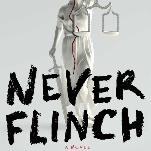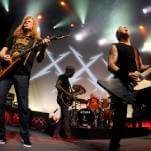The series was something of a breakthrough for Showtime, its first show to be nominated for an Outstanding Comedy Series Emmy and the beginning of what would become a foundation of original programming that allowed the premium cable channel to at least ostensibly compete with HBO in that area. And yet, by the time Weeds reached the end of its fourth season, the season for which it was nominated for that Emmy, the show was on its last breath among the critics and award-voting bodies that helped elevate it into that position. It would become the last season to earn Emmy nominations in major categories, and the last season to merit any significant critical attention.
Returning to my review of the seventh season finale, you may be surprised to find me here. I had reached a breaking point with the show, frustrated by a season that abandoned what interesting stories it developed in order to justify the detour into the suburbs so Kohan could have her narrative symmetry. And yet once Showtime finally confirmed that this would in fact be the show’s last season, I realized that I wanted to see this through to the end. Sitting down to watch “Messy,” there was a calm knowing that this season would, by default, be forced to mean something again. While I wouldn’t say I’m optimistic about this season, the certainty of its place in Weeds’ larger narrative makes it considerably more palatable.
Unfortunately, “Messy” is too busy cleaning things up—hence the title—to successfully get to any subtle thematic work. That’s what happens when your protagonist gets shot in the head and spends most of the episode in a medically induced coma. On the one hand, there is a certainly a thematic purpose to Nancy’s condition, as it allows Kohan to explore what her absence would mean to these characters, and to the audience. What would the loss of the mother figure mean to the Oedipal siblings whose entire identities have been shaped by their relationship with Nancy (whether it’s Silas getting into the family business or Shane ending up on the other side)? Would Andy be losing a sister, a friend, or a partner if Nancy were to die? Even though the chances of Nancy dying are enormously slim, the possibility raises some good questions, and the episode gets some decent mileage out of them.
However, it’s unclear if that’s worth losing Mary-Louise Parker for the bulk of an episode. The thematic absence works, but the actual absence doesn’t, as “Messy” is left to rely on characters that are infinitely less interesting than Nancy. Kohan structures the episode purposefully—too purposefully given how writerly it feels—to allow different characters a chance to interact with Nancy’s lifeless body, but that only calls attention to how little I’m invested in these characters. Doug molesting Nancy has a bawdy charm to it, but it also highlights how the show has let the character stray too far from any shred of dimensionality. Similarly, Silas has nothing of any substance to do at his mother’s bedside because the end of last season wiped away the ledger of their complicated relationship. Instead of Nancy’s near-death experience giving those characters new life, it drew attention to the dead-end place they were left in at the end of last season.
While Silas and Doug are without any clear storylines for the season ahead, the two storylines that do develop as part of those conversations are on two opposite paths. In the case of Andy and Jill’s burgeoning relationship, it’s a storyline I don’t buy that’s being sold tremendously well. As we saw last season, Kohan has a far better grasp on Jill than some of the show’s other writers, and Jennifer Jason Leigh continues to deliver a strong performance. That scene by Nancy’s bedside is the closest I’ve come to caring about the character, but that still doesn’t convince me that Andy and Jill are anything but a convenient romantic coupling designed in a writer’s room. Justin Kirk is tremendous in his scene with the chaplain, which stands as the most compelling stretch of “Messy” by a long shot, and there’s hope that Andy’s relationship with Nancy will play a big role as the show reaches its conclusion. However, Jill’s involvement remains artificial, failing to connect with long-term character development even with some strong performances.
Conversely, Shane’s time in the police academy remains a really good idea that Alexander Gould simply isn’t selling well enough. From his “emotional” reaction to his failed chase of Nancy’s shooter to his attempt to take over the crime scene, and in his time spent at Nancy’s bed, I felt no connection to Shane as a character because Gould was not making that connection as an actor. I don’t like to outright criticize one performer, and there are moments—usually involving either cockiness or creepiness—where Gould is effective in the role, but as much as I like the idea of Shane in the police academy, I have concerns about the execution based on what I saw in “Messy” (and, I’ll be honest, what I’ve seen in next week’s episode as well).
However, at least according to Showtime’s PR, what really matters about this episode has nothing to do with characters and everything to do with that tantalizing mystery from the end of last season. While Showtime tries to make “Who Shot Nancy?” into an actual thing, I’ll just be over here really, really not caring. I’m glad the writers went through with having Nancy be the victim, and that image of Mary-Louise Parker covered with blood was incredibly striking, but Tim Scottson’s search for revenge remains a generic stand-in for a more interesting consideration of the ramifications of her actions. The idea of Nancy being forced to face retribution for her actions is a logical way to end the series, but giving it an actual surrogate places a lot more pressure on the show to deliver, and that reveal felt dull, predictable, and the exact opposite of the major event Showtime wants it to be. Daryl Sabara—a.k.a. Spy Kids kid—only got a single line to sell the character’s motivations, but it wasn’t the convincing performance the moment needed to validate his involvement moving forward.
The same could be said for the episode as a whole. I understand the logic of using the episode as an epilogue to Nancy’s shooting, but nothing here got me any more excited about the rest of the season. “Messy” might nod to certain themes, and that credit sequence might signal Weeds coming full circle, but neither the larger story nor the season ahead felt any more meaningful in this 26-minute span—we’ll see the final 12 episodes are any more successful.
Stray observations:
- While Malvina Reynold’s version of “Little Boxes” is used to mark the song’s returns, covers return next week.
- Is it weird that Stevie showed no emotion regarding his mother’s potential death? I know his family situation is screwy, but it still seems odd that the kid didn’t cry or something. I get that Jill’s twins have no emotions, but Stevie is such a non-entity that even his mother getting shot brings no reaction?
- While I hate to open up with two nitpicks, is Nancy running such a clean operation that no one freaks out about cops walking around her property? And are cops on this show still so stupid that no one thinks to investigate what Nancy might be doing to cause this? Doesn’t she have a file?
- When someone eventually breaks down the writing tics of Jenji Kohan, that scene with the two elderly neighbors will be used to typify her love of quirky observers (reminding me a lot of the opening scene of the show’s third season). Like many scenes in the episode (including the hospital administrator’s speech about health care systems and the running gag with Nancy’s roommate’s loved one), it was overwritten to the point of distraction.
- I enjoyed the little detail of Jill grabbing the photo of Judah to take to the hospital—a more subtle way in which the episode tried to bring us back to the show’s past.
- Congrats to A.V. Club user MarkInTexas for calling Tim Scottson being the shooter in last year’s comments.
- I have a feeling that things might be fairly light around here again this year in terms of comments, at least until the finale, but I’m particularly interested in hearing your thoughts on what—if anything—you expect from the eighth season.







































